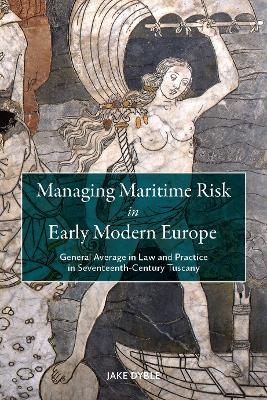
Managing Maritime Risk in Early Modern Europe
General Average in Law and Practice in Seventeenth-Century Tuscany
Seiten
2025
Boydell & Brewer (Verlag)
978-1-83765-155-9 (ISBN)
Boydell & Brewer (Verlag)
978-1-83765-155-9 (ISBN)
- Noch nicht erschienen (ca. März 2025)
- Versandkostenfrei
- Auch auf Rechnung
- Artikel merken
Draws on the rich surviving archives of the Tuscan port of Livorno to explore how General Average worked.
Commercial seafaring, both dangerous and with large amounts of capital at stake, was the source of the risk-management institutions that still undergird the global economy today. A key institution of early modern risk management was General Average, a procedure used to redistribute extraordinary costs arising from a maritime venture between all financially interested parties. For example, should one merchant's cargo be jettisoned to lighten a ship in a storm, the loss would be shared pro rata by the shipper and all the cargo-owners. A risk-sharing practice, different from the risk-shifting of marine insurance which became established relatively late, General Average is still in widespread use.
This book explores how General Average worked. It reveals the gap between General Average in law and how it worked on the ground. It shows how General Average partitioned a wide array of business costs, thereby performing a significant role in structuring maritime commerce, managing risk and promoting shipping and trade. In addition, the book discusses how far General Average was a feature of a supposedly ancient, universal, customary maritime law, and contributes to debates about the evolution of institutions in economic development.
Commercial seafaring, both dangerous and with large amounts of capital at stake, was the source of the risk-management institutions that still undergird the global economy today. A key institution of early modern risk management was General Average, a procedure used to redistribute extraordinary costs arising from a maritime venture between all financially interested parties. For example, should one merchant's cargo be jettisoned to lighten a ship in a storm, the loss would be shared pro rata by the shipper and all the cargo-owners. A risk-sharing practice, different from the risk-shifting of marine insurance which became established relatively late, General Average is still in widespread use.
This book explores how General Average worked. It reveals the gap between General Average in law and how it worked on the ground. It shows how General Average partitioned a wide array of business costs, thereby performing a significant role in structuring maritime commerce, managing risk and promoting shipping and trade. In addition, the book discusses how far General Average was a feature of a supposedly ancient, universal, customary maritime law, and contributes to debates about the evolution of institutions in economic development.
Jake Dyble is a post-doctoral researcher at the University of Padova, Italy
List of Illustrations
Acknowledgments
List of Abbreviations
Note on Dates, Currencies, and Terminology
Introduction
1. The Free Port of Livorno and its Pisan Court
2. Defining Average in Early Modern Italy and Europe
3. Average in Practice: The Evidence from the Pisan Archive
4. Commercial Justice and Political Economy: Stephen Dring's Tale
5. How Early Modern Shipping Managed Risk
Conclusion
Appendix
Bibliography
Index
| Erscheint lt. Verlag | 11.3.2025 |
|---|---|
| Zusatzinfo | 7 graphs |
| Verlagsort | Woodbridge |
| Sprache | englisch |
| Maße | 156 x 234 mm |
| Themenwelt | Geschichte ► Allgemeine Geschichte ► Neuzeit (bis 1918) |
| Geschichte ► Teilgebiete der Geschichte ► Wirtschaftsgeschichte | |
| ISBN-10 | 1-83765-155-8 / 1837651558 |
| ISBN-13 | 978-1-83765-155-9 / 9781837651559 |
| Zustand | Neuware |
| Haben Sie eine Frage zum Produkt? |
Mehr entdecken
aus dem Bereich
aus dem Bereich
Europa 1848/49 und der Kampf für eine neue Welt
Buch | Hardcover (2023)
DVA (Verlag)
CHF 67,20
Giordano Bruno - ein ketzerisches Leben
Buch | Hardcover (2024)
C.H.Beck (Verlag)
CHF 41,85


